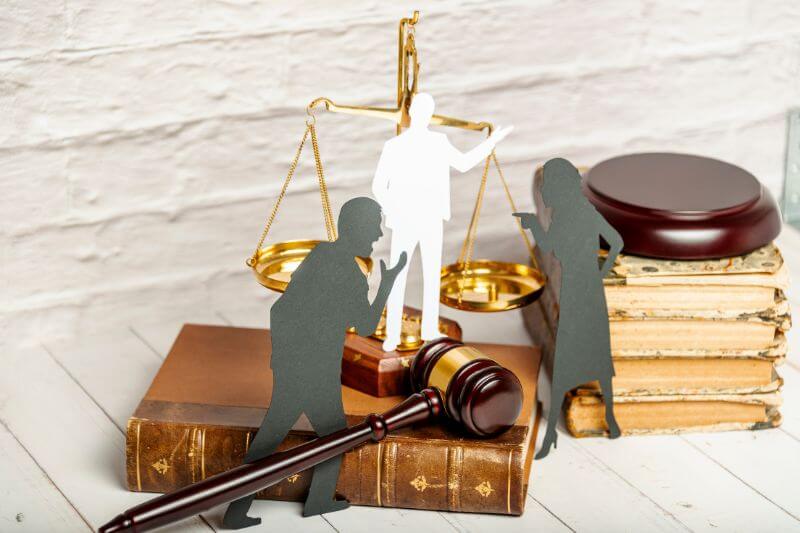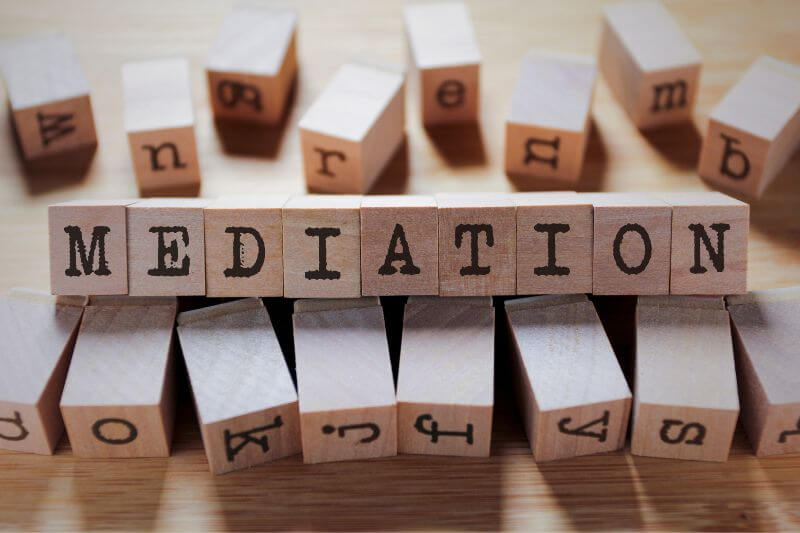Divorce mediation is often considered a peaceful and cooperative alternative to litigation. It allows couples to work together to reach agreements on important matters like child custody, asset division, and support. Over time, mediation has grown in popularity as a less adversarial approach to ending a marriage.
However, it’s important to understand that mediation isn’t always the best option—especially in situations involving manipulation, intimidation, dishonesty, fear, or unequal power dynamics. Factors like trauma, mistrust, hostility, and emotional distress can significantly impact the ability of both parties to communicate effectively or reach fair compromises.
At PRO LAW GROUP, Las Vegas Divorce Attorney Donn W. Prokopius is committed to helping you make informed decisions about your divorce. He will assess your situation and provide honest advice about whether mediation is the right path or if another strategy may better serve your needs.
Even though legal representation isn’t required for mediation, having an experienced Las Vegas divorce attorney by your side can make all the difference. Donn W. Prokopius will guide you through your options and protect your rights every step of the way.
Schedule a consultation today by calling (702) 474-0500 to find out what divorce strategy best fits your circumstances.
Understanding Divorce Mediation
In the divorce mediation process, spouses collaborate with the mediator—an impartial third party—to settle their marital concerns, including money issues, child custody, and property division. This non-adversarial approach promotes candid communication and teamwork among all involved parties. The mediator helps the couple find common ground, hastens the discussions, and arrives at solutions that both parties can agree upon.
Divorce mediation is designed to support both spouses’ interests while prioritizing their children’s well-being. By focusing on achieving a favorable outcome without the need for a judge to make critical decisions, mediation can help streamline divorce proceedings and address disputes more amicably. In cases involving child support or complex issues, consulting a divorce lawyer ensures that all legal aspects are properly managed, safeguarding the long-term interests of everyone involved.
The Benefits of Divorce Mediation
Nevada acknowledges the following benefits of divorce mediation:
- Cost-Efficiency: Mediation is often less expensive than traditional litigation since it needs fewer court appearances and lawyer fees.
- Faster Resolution: The financial and emotional impact on both parties is lessened when divorce settlements are reached more quickly through mediation.
- Confidentiality: Confidential mediation procedures guarantee the privacy of personal matters.
- Customized Solutions: Couples can customize agreements through mediation to fit their specific needs, including property division and child custody.
Divorce mediation provides an environment that encourages negotiation and cooperation, enabling individuals to work with a third party to resolve disputes. It lessens the emotional and financial burden that can accompany a contentious court case while giving divorcing couples greater control over the outcomes of their separation. Parents, in particular, can focus on building a future that prioritizes the well-being of their children.
However, mediation may only be a suitable solution in some instances. Specific issue-specific reasons, such as a lack of cooperation or signs of hostility, may undermine the process. In these cases, speaking with divorce attorneys can help individuals gain a clearer perspective and explore alternative options. Couples must evaluate their unique circumstances to determine whether mediation aligns with their needs and goals for each other and their future.
How Long Does Divorce Mediation Usually Take?
The amount of issues a couple wishes to mediate and the intricacy of those issues will determine how long divorce mediation takes. You can finish mediation in one or two sessions if you need to work through a few minor issues. However, in instances where substance abuse, complexities in custody arrangements, or disputes over businesses arise, mediation may take longer.
If multiple topics need to be addressed, it can require a few months of weekly mediation sessions. Transparency, resources, and the ability to engage in productive negotiations are essential for mutually agreeable arrangements. In some cases, the involvement of professionals such as a divorce mediator or other experts in divorce law can help couples navigate complex decision-making processes more efficiently.
The duration of a mediation session might range from one to eight hours. For some couples, resolving their problems and achieving their goal of fair outcomes requires one long mediation session. At times, however, unresolved disputes or challenging behavior may necessitate transitioning to court proceedings or divorce litigation to finalize arrangements effectively.
In theory, mediation may be finished in a single day, but the times required depend on the individuals involved and the nature of the issues being discussed. Victims of abuse or those navigating tough negotiations may benefit from additional legal guidance to ensure that custody arrangements, financial agreements, and other aspects of the divorce process are handled equitably.
Do Divorce Mediation Couples Reconcile?
The mediator’s role is not to help couples reconcile but to assist them in settling for a just divorce. Mediators focus on helping clients reach agreements on critical matters such as child custody arrangements, financial disclosures, and other challenges that arise during divorce proceedings.
Rarely, during mediation, a couple discusses their differences and finds that their communication has improved, leading to reconsidering their positions. In some scenarios, this renewed understanding may spark interest in reconciliation. However, mending their relationship differs from the mediator’s role or expertise. Instead, mediators remain neutral, focusing on facilitating fair agreements and reducing animosity.
If a couple decides against getting a divorce, they should attend a couple’s counselor to work on their marriage. Counselors are better equipped to address the emotional challenges and differences between partners, fostering the level of participation and cooperation needed to rebuild trust.
In cases where mediation reveals evidence of unresolved issues or additional support, couples may still need access to resources such as legal professionals, especially if disclosure gaps or other complexities arise. For areas like New York or cases involving specific disputes, courts may still play a role in determining the outcome.
Ultimately, mediation is a valuable tool for assisting individuals in navigating their divorce with a fair-minded approach. The type of support needed depends on the lives and scenarios of the clients involved. The mediator’s job is to provide a framework for resolution, keeping in mind the best chances for a fair outcome while encouraging open communication and reduced hostility.
Situations When Divorce Mediation Is Not Recommended
There are several pros and cons to mediating divorce. Divorce mediation has several benefits, such as lower costs, quicker settlement, and a collaborative approach, but it also has drawbacks. The willingness of the parties to make concessions and have honest communication is essential to the mediation’s success. Mediation might not be ideal when these requirements are not fulfilled, especially with power disparities and complicated difficulties. The following are the most typical circumstances where mediation isn’t the best course of action:
- High Conflict: Mediation might not be the ideal option if there is a great deal of tension and communication difficulties between you and your spouse. In certain situations, the extreme intensity of the emotions may impede productive discussions and make agreement-making difficult.
- Domestic Violence or Abuse: In cases where there is a history of domestic violence or abuse, mediation may not be safe or appropriate. The power imbalance in such relationships can hinder open and honest communication, making it challenging to reach a fair agreement.
- Refusal to Cooperate: Mediation becomes useless if one party is unwilling or refuses to engage honestly or negotiate in good faith. Both sides’ willingness to work together and identify points of agreement is necessary for a mediation to be effective.
- Complex Financial Situations: Seeking legal counsel from an attorney or financial expert can be crucial in situations involving complex financial concerns, such as various assets, complex investments, or considerable debts, to secure a fair settlement.
- Legal Complexity: Consulting a divorce attorney in Las Vegas may be necessary to correctly negotiate complex legal matters that need interpretation or experience, such as sophisticated tax implications or complex legal agreements.
When to Transition from Mediation?
It could be time to look into alternative options if you have started mediation already but discover that it needs to produce positive results or if any of the above situations occur during mediation. In some divorce cases, unresolved conflicts, power dynamics, or heightened anxiety and stress can hinder productive collaboration. When this happens, switching from mediation to legal counsel can safeguard your rights, ensure proper judgment regarding things like liabilities and alimony, and guarantee your voice is heard.
Engaging a family law attorney ensures you have the means to address complex issues, such as enforcing agreements or addressing unfair treatment if one partner is at a disadvantage. Legal representation may offer a more effective resolution than mediation in cases involving income disparities, ongoing disputes, or unresolved power struggles.
Working collaboratively may not suit every divorce case, especially when one person feels like a victim or when both parties’ perspectives differ significantly. Divorce mediators aim to encourage fairness, but alternative approaches may be necessary in scenarios where the judgment of a neutral party cannot resolve underlying conflicts.
Key Signs Mediation Might Not Work for Your Divorce
Divorce mediation can be a cost-effective and peaceful method for resolving disputes, but there are better fits. Recognizing critical signs that mediation might fail is essential to making informed decisions. If there is an imbalance of power between the partners or someone feels like a victim, the process can quickly become ineffective. High levels of hostility, intimidation, or unresolved conflicts may hinder collaboration and lead to anxiety and stress.
Additionally, dishonesty, lack of transparency, or failure to fully disclose assets and liabilities can prevent fair outcomes. When severe power dynamics are at play, such as abuse or manipulation, the process becomes uneven, and the playing field is no longer equal. The advantage of mediation diminishes in these cases, making it a less compelling option. In such cases, consulting a family law attorney ensures the rights of all sides are protected and provides a solid factor in determining the right course of action. There may also be a reason to consider alternative methods like litigation to ensure fairness and protect both parties’ interests.
Exploring Alternatives to Divorce Mediation
When mediation isn’t working, there are numerous alternatives to consider. Divorce litigation is one of the most commonly chosen methods when disclosure issues, power dynamics, or unresolved conflicts make mediation unsuitable. Litigation provides a structured approach where courts have the final say on matters like child custody arrangements, alimony, and the division of property and investments.
Collaborative divorce may offer a more flexible form of dispute resolution for couples who want to avoid court formalities. It emphasizes team-based problem-solving, where legal professionals and financial experts guide both sides toward a fair outcome. For some scenarios, arbitration can also be compelling, where a neutral third party makes binding decisions. Exploring these opportunities with a legal professional can ensure the most suitable path for your life and future.
Challenges That Can Complicate the Mediation Process
Mediation has its challenges. High levels of hatred, hostility, and stress can erode the possibility of constructive negotiations. Situations involving intimidation, manipulation, or coercion can create an unsafe environment for open communication. Disparities in income, unequal resource access, or unresolved liabilities may lead to unfair results.
Additionally, differences in goals or misaligned perspectives can stall progress. For example, disagreements on custody arrangements or business disputes may require evidence-based interventions that mediation alone cannot provide. Understanding the complexities of these cases and seeking guidance from divorce mediators or legal experts is critical to navigating these hurdles effectively.
The Role of Legal Counsel in Divorce Mediation Decisions
The involvement of a family law attorney can significantly enhance your chances of achieving fair results during mediation. Legal professionals provide judgment and insight into alimony, property, and child custody arrangements, ensuring you maximize your position. They can also assess the implications of agreements and advocate for enforcement of terms if one partner fails to meet obligations.
Legal counsel ensures that the playing field remains level, particularly when power dynamics or conflicts threaten the fairness of the process. They can identify whether mediation aligns with your best interests or whether alternative means, such as litigation, are necessary. Working with experienced attorneys ensures that your rights and interests are protected every step of the way.
Balancing Power Dynamics in Mediation
In cases where power dynamics threaten to undermine the mediation process, ensuring balance is crucial. An experienced divorce mediator can create an environment where both sides feel heard and respected. However, significant disparities in income, access to resources, or control over critical decisions can create challenges.
For example, in cases involving manipulation, intimidation, or even coercion, one person may feel disadvantaged, leading to further anxiety and stress. Recognizing these imbalances early allows both parties to explore ways to restore fairness. This might involve introducing a neutral third party, such as a mediator with expertise in handling sensitive divorce cases or seeking legal advice to protect the weaker party’s position.
Ultimately, balancing power dynamics requires understanding each party’s perspectives, addressing conflicts, and finding practical solutions to maintain fairness. This ensures that the process remains equitable, paving the way for a resolution that works for everyone.
Making a Well-Informed Decision
Before deciding if divorce mediation is the right path, it’s essential to speak with a knowledgeable family law professional. Attorney Donn W. Prokopius at PRO LAW GROUP can provide valuable insight into your situation, helping you weigh your options and determine whether mediation can truly level the playing field—or if another approach better aligns with your needs and goals.
Mediation can be a useful strategy for couples looking to resolve matters peacefully and move forward with minimal conflict. However, it’s not always ideal—especially in divorces involving high conflict, power imbalances, or complex legal and financial issues. Making an informed decision means understanding the full scope of your circumstances and the potential risks involved.
Attorney Prokopius will walk you through the pros and cons of mediation, ensure your rights are protected, and help you choose the legal strategy that best serves your interests. With years of experience in Nevada family law, he provides honest, strategic advice tailored to your unique case.
Call PRO LAW GROUP at (702) 474-0500 to schedule a consultation and get the guidance you need to move forward with confidence.
Frequently Asked Questions
- What is divorce mediation?
- Divorce mediation is a process where both spouses work with an impartial third-party mediator to settle disputes related to issues like child custody, property division, and financial matters, aiming for a peaceful, cooperative resolution without going to court.
- Why is divorce mediation becoming popular?
- Mediation is gaining popularity because it offers a less contentious, more cost-effective, and faster alternative to litigation. It allows spouses to make decisions together, often with less emotional and financial stress.
- When is divorce mediation not recommended?
- Mediation may not be suitable when there are issues such as high conflict, domestic violence, fear or intimidation, manipulation, dishonesty, power imbalances, or complex financial and legal matters.
- Can divorce mediation work if one party refuses to cooperate?
- No, mediation requires both parties to be willing to negotiate in good faith. If one spouse refuses to cooperate or is unwilling to make concessions, mediation may not be effective.
- How long does divorce mediation typically take?
- The duration of mediation depends on the complexity of the issues involved. It could range from a few hours in simple cases to several months for more complex disputes.
- Is divorce mediation a good option if there has been domestic violence?
- No, mediation is generally not recommended in cases of domestic violence or abuse. The power imbalance can prevent honest communication and make it unsafe for the victimized party to participate effectively.
- Can divorce mediation lead to reconciliation?
- The mediator’s role is not to help couples reconcile but to facilitate a fair divorce settlement. While some couples may improve communication during mediation, it is not designed as a tool for marriage reconciliation.
- What should I do if divorce mediation isn’t working for me?
- If mediation is not producing results, consider transitioning to divorce litigation or consulting a divorce attorney to explore other legal avenues that might be more effective for resolving disputes.
- How can legal counsel help during divorce mediation?
- A family law attorney can provide essential legal advice, ensure fair treatment, and protect your rights during mediation. Attorneys can also help with complex legal or financial issues and ensure that any agreements made are in your best interest.
- What alternatives to mediation can be considered if it’s not effective?
- Alternatives to mediation include divorce litigation, collaborative divorce, or arbitration. Each option has its own processes and may be more appropriate depending on the specifics of the case, especially in cases with high conflict or complex issues.



